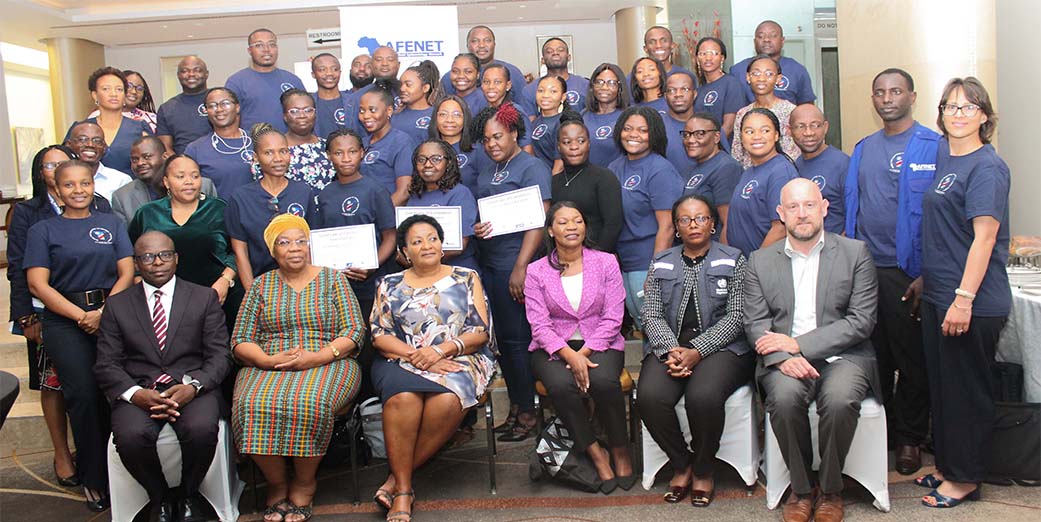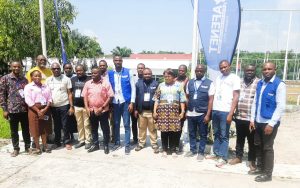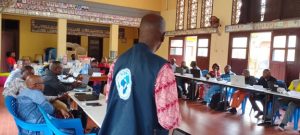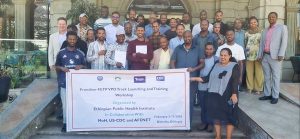Cohort VII graduation brings to 217 total of frontline epidemiologists in Namibia
-
by
AFENET

On 8 September 2022, the Namibia FELTP held a graduation ceremony for Cohort VII of the frontline tier bringing the total of Frontline FETP graduates to 217 since the establishment of the program in 2012.
A total of 29 (13 male and 16 female) trainees from eight regions (Khomas, Hardap, Erongo, Oshikoto, Ohangwena, Omusati, Otjozondjupa, Kavango East) participated in the training. They were drawn from various government ministries and agencies including: the Ministry of Health and Social Services (16 nurses, 3 medical doctors and 5 environmental health practitioners), Namibia Institute of Pathology (1 medical lab technologist), Ministry of Defence (2 environmental health practitioners), National Health Training Network (1 senior health program officer) and Ministry of Agriculture and Land Reforms (1 veterinarian).
Speaking at the event, Dr Utjiua Muinjangue – the Deputy Health Minister noted that the training came at an opportune time during the COVID-19 pandemic, when there is need for a skilled public health workforce to be able to detect, investigate and institute appropriate control measures timely.
She also urged the graduates to transform service delivery in their respective workstations.
Dr Muinjangue also congratulated the program for celebrating 10 years and appreciated the support from partners and stakeholders to the program since inception.
The event was also attended by Dr Brian Baker – CDC Country Director, Dr Notion Gombe – AFENET Regional Technical Coordinator for Southern Africa, and representatives from WHO, Robert Koch Institute (RKI) and the University of Namibia.
“I honed the same core skills of epidemiology that you have learned during this course – collecting data, verifying data, analyzing data, and most of all, making sense of data. This last step, making sense of the data, is the most important, as this is the truly unique skill of epidemiology that you have begun to learn during this course, and will continue to grow in the years to come. Be vigilant in applying and improving this skill! This course has helped you to be a first responder; to know how to react when there is a disease outbreak; to always be on the lookout for disease outbreaks.” – Dr Brian Baker, CDC Country Director Namibia.
Dr. Notion Gombe – AFENET RTC for Southern Africa pledged continued support from AFENET and encouraged the graduates to use competencies gained to build a self-reliant and resilient public health system in Namibia with capacity to prevent, detect and respond to any public health threat that may arise. “From the COVID-19 pandemic with restricted travel, we learnt that every country needs its own skilled workforce to deal with emerging and re-emerging health security threats.”
Speaking on behalf of Dr. Charles Sagoe-Moses – the WHO Country Representative, Dr Catherine Muwonge appreciated the FETPs’ role in assisting countries to achieve stronger and more resilient health systems that are better prepared and able to respond to public health emergencies. She highlighted that the graduation came at the right time while Namibia is in the initial stages of rolling out the Emergency Preparedness and Response (EPR) flagship initiative that aims to strengthen the country’s capacity to prepare for, detect and respond to emergencies with public health consequences.
Dr Muwonge urged graduates to use the course as a stepping-stone to greater opportunities and commended AFENET, US-CDC and other health development partners for the continuous commitment to the program. She also pledged WHO’s continued support.
Dr Christian Winter – Robert Koch Institute Coordinator in Namibia re-emphasized that the COVID-19 pandemic clearly demonstrated the need to have more skilled field epidemiologists on the ground to lead outbreak investigations including contact tracing. He commended the efforts by the Ministry of Health and NamFELTP in responding quickly to this need.



